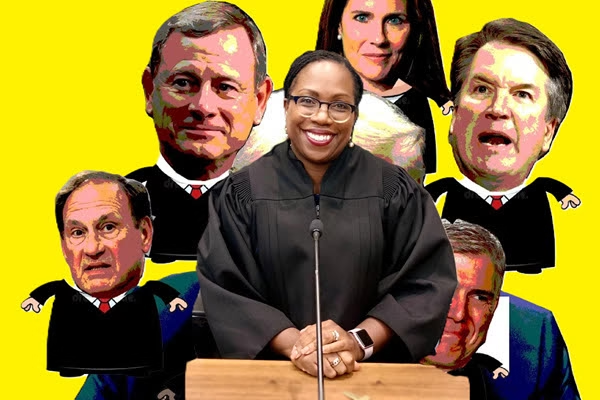The U.S. Supreme Court’s conservative majority has faced criticism for decisions seen as undermining democratic norms. In contrast, Justice Ketanji Brown Jackson has drawn attention for her dissents, often aimed at protecting procedural fairness and minority rights while signaling guidance for future jurists — much like Justice John Marshall Harlan’s lone dissent in Plessy v. Ferguson, the 1896 Supreme Court decision that upheld segregation laws. Harlan’s dissent declared the Constitution “color-blind” and intolerant of classes among citizens.
Since joining the Supreme Court, Jackson has authored several notable dissents:
- Chinn v. Shoop (death-row case) – Jackson dissented from the denial of review, arguing that suppressed evidence could have affected the outcome. She was joined by Justice Sonia Sotomayor.
- Glacier Northwest, Inc. v. International Brotherhood of Teamsters (2023) – The sole dissent addressed whether a state tort suit for property damage during a strike is preempted by the National Labor Relations Act. Jackson warned the decision could weaken workers’ right to strike and undermine the National Labor Relations Board. She wrote: “Workers are not indentured servants, bound to continue laboring until any planned work stoppage would be as painless as possible for their master.”
- Trump v. CASA, Inc. (2025) – Jackson dissented separately from the majority’s ruling limiting lower courts’ ability to issue nationwide injunctions against executive actions, calling it “an existential threat to the rule of law.” She argued that allowing the executive to act against people who have not yet sued is dangerous.
Jackson will appear as a visiting lecturer at California State University, Dominguez Hills, this fall as part of the Presidential Distinguished Lecture Series. Her lecture, “Lessons from My Life in the Law,” will include a discussion with CSUDH President Thomas A. Parham and a faculty panel. The series, established by Parham, aims to engage the campus and community in conversations on pressing societal issues.
Last week, the Roberts Court heard arguments in Louisiana v. Callais, a case challenging whether Louisiana’s remedial congressional map — adding a second majority-Black district to comply with Section 2 of the Voting Rights Act — constitutes unconstitutional racial gerrymandering. Plaintiffs argue race predominated in the map’s design; the state contends it was necessary to remedy minority vote dilution. The court is examining the balance between Section 2 protections and the Constitution’s Equal Protection and 15th Amendment limits.
While Jackson is unlikely to comment on this or other pending cases at the lecture, her perspective at this moment is especially timely.



